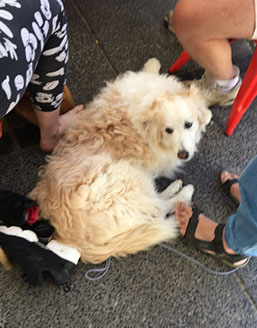Ian Laurence Kerr
Individual, Couple & Family Counselling
ARE YOU A PEOPLE PLEASER?
 Meet Sheppie, the border collie. Sheppie is nearly always a people pleaser, but he doesn’t please one particular person, “E”, who doesn’t like dogs. He seems to try harder to please E however but never succeeds. Do you sometimes set out to please people? If so, under what circumstances? How successful are you?
Meet Sheppie, the border collie. Sheppie is nearly always a people pleaser, but he doesn’t please one particular person, “E”, who doesn’t like dogs. He seems to try harder to please E however but never succeeds. Do you sometimes set out to please people? If so, under what circumstances? How successful are you?
We try to please others for all sorts of reasons. We might think they’ve had a rough trot lately. They might be a customer in our café. Maybe we like to spread joy? When asked to help someone, we might feel guilty if we say no. In an abusive relationship, the one being abused might think that if they please the abuser, then the abuse will stop.
Do any of these situations seem familiar to you?
A friend asks you to do something, & even though you don’t really want to, you say “yes”.
You’ve already started helping a friend out with something, but it’s starting to become obvious that it’s going to take a lot longer than you thought.
If someone expresses a need, which requires your help, you find it hard to say “no”.
Someone has asked you to help out with something down the track a bit, & as the day draws closer, & other things come up, you start to wish you’d said “I’ll think about it”.
If someone asks for your help, you give excuses or reasons as to why you can’t help. They then counter your excuses, so you then feel you have to say “yes”.
When is pleasing people appropriate?
You might say to yourself “Yes, I am a people pleaser”, & might be tempted to resolve to never please anyone ever again, but at the same time, you realize there’s no sense in that. So how do you find the middle ground? You may feel that pleasing a person by doing something in particular is worth it, but on the other hand, some people in your life might seem to be “all take and no give”. Have a think about whether it serves you, to keep on pleasing a particular person. In relationship with others, sometimes it’s worth writing a list of the benefits and the costs of helping someone in particular. If you find it hard to list any benefits, then it may not be appropriate to continue trying to please them in the future.
Sometimes, being a people pleaser can be developed early in a person’s childhood. One thing you could check is, “Are there any examples in my childhood, of times when I was encouraged to please someone?” If so, make a list. The length of that list may surprise you. ☺ 24/10/2016
Previous Blogs:
04/11/2016 13.00
08/06/2016 16:25
26/04/2016 12:14
Trauma, Brain & Relationship: Helping Children Heal
14/04/2016 16:24
Does Developmental Trauma Disorder (DTD) exist?
14/04/2016 16:22
31/03/2016 16:31
Site: much ado digital